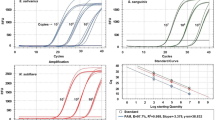Abstract
Storage conditions influence the integrity of the recoverable DNA from forensic evidence in terms of yield and quality. FTA cards are widely used in the forensic practice as their chemically treated matrix provides protection from the moment of collection to the point of analysis with current STR typing technology. In this study, we assess the recoverability and the integrity of DNA from 11-year-old saliva on FTA cards using a forensic quantitative real-time polymerase chain reaction (qPCR) commercial assay. The quality after long-term storage was investigated in order to evaluate if the FTA device could assure enough stability over time, applying some internally validated quality criteria of the STR profile. Furthermore, we used a 3D interpolation model to combine the quantitative and qualitative data from qPCR to calculate the minimum optimal DNA input (MODI) to add to the downstream PCR reaction based on the quantitative and qualitative data of a sample. According to our results, when saliva sample is properly transferred onto FTA cards and then correctly stored according to the manufacturer’s instructions, it is possible to recover sufficient amounts of DNA for human identification even after more than a decade of storage at ambient temperature. Degradation affected the quality of results especially when the Degradation Index exceeds the value of 2.12, requiring modifications of the standard internal workflow to improve the genotyping quality. Above this value, the application of a “corrective factor” to the PCR normalization process was necessary in order to adjust the recommended manufacturer’s PCR DNA input taking into account the degradation level. Our results demonstrated the importance to consider in predictive terms the parameters obtained with the real-time quantification assay, both in terms of quantity (DNA concentration) and of quality (DI, inhibition). Informatics predictive tools including qPCR data together with the variables of storage duration and conditions should be developed in order to optimize the DNA analysis process.
Similar content being viewed by others
References
Vernarecci S, Ottaviani E, Agostino A, Mei E, Calandro L, Montagna P (2015) Quantifiler Trio Kit and forensic samples management: a matter of degradation. Forensic Sci Int Genet 16:77–85
Alaeddini R, Walsh SJ, Abbas A (2010) Forensic implications of genetic analyses from degraded DNA—a review. Forensic Sci Int Genet 4:148–157
Davis DL, O’brien EP, Bentzley CM (2000) Analysis of the degradation of oligonucleotide strands during the freezing/thawing processes using MALDI-MS. Anal Chem 15:5092–5096
Kampmann ML, Buchard A, Børsting C, Morling N (2016) High-throughput sequencing of forensic genetic samples using punches of FTA cards with buccal swabs. Biotechniques. 61:149–151
Green H, Tillmar A, Pettersson G, Montelius K (2019) The use of FTA cards to acquire DNA profiles from postmortem cases. Int J Legal Med. https://doi.org/10.1007/s00414-019-02015-2
Mundorff AZ, Amory S, Huel R, Bilić A, Scott AL, Parsons TJ (2018) An economical and efficient method for postmortem DNA sampling in mass fatalities. Forensic Sci Int Genet 36:167–175
GE Healthcare life sciences, Application note 29-0082-33 AA, STR amplification of DNA from buccal and blood samples stored long-term on Whatman FTA cards (2011) Available from: https://www.gelifesciences.com/en/it/solutions/Forensics/Products%20and%20Technology/Sample%20Purification%20Transport%20and%20Storage/Long-term%20and%20room%20temperature%20storage
Rahikainen AL, Jukka UP, de Leeuw W, Budowle B, Sajantila A (2016) DNA quality and quantity from up to 16 years old post-mortem blood stored on FTA cards. Forensic Sci Int 261:148–153
Hedell R, Hedman J, Mostad P (2018) Determining the optimal forensic DNA analysis procedure following investigation of sample quality. Int J Legal Med 132:955–966
Ewing MM, Thompson JM, McLaren RS, Purpero VM, Thomas KJ, Dobrowski PA, DeGroot GA, Romsos EL, Storts DR (2016) Human DNA quantification and sample quality assessment: developmental validation of the PowerQuant system. Forensic Sci Int Genet. 23:166–177
PowerQuant System Technical Manual, 3/18. Available at: http://www.promega.com/resources/protocols/technical-manuals/101/powerquant-system-protocol/ (Accessed 14.03.19)
AmpFlSTR Identifiler Plus PCR Amplification Kit User Guide Rev F/15. Available at: https://www.thermofisher.com/order/catalog/product/4427368 (accessed 14.03.19)
Hansson O, Gill P, Egeland T (2014) STR-validator: an open source platform for validation and process control. Forensic Sci Int Genet 13:154–166
Butler J (2012) Advanced topics in forensic DNA typing: methodologies. Academic Press, Massachusetts
Quality Assurance Standards for Forensic DNA Testing Laboratories. Available at: https://www.fbi.gov/file-repository/quality-assurance-standards-for-forensic-dna-testing-laboratories.pdf/view (Accessed 14.03.19)
GE Healthcare Life Sciences, Application note 28-9822-22 AA, Reliable extraction of DNA from Whatman™ FTA™ cards (2010) Available from: https://us.vwr.com/assetsvc/asset/en_US/id/16147319/contents
Applied Biosystems, AmpFlSTR® Identifiler® Plus PCR Amplification Kit User Guide, Revision F
Balding DJ (2013) Evaluation of mixed-source, low-template DNA profiles in forensic science. Proc Natl Acad Sci U S A 110:12241–12246
Huang LH, Lin PH, Tsai KW, Wang LJ, Huang YH, Kuo HC, Li SC (2017) The effects of storage temperature and duration of blood samples on DNA and RNA qualities. PLoS One 12(9):e0184692. https://doi.org/10.1371/journal.pone.0184692
Badu-Boateng A, Twumasi P, Salifu SP, Afrifah KA (2018) A comparative study of different laboratory storage conditions for enhanced DNA analysis of crime scene soil-blood mixed sample. Forensic Sci Int 292:97–109
Lin S, Li C, Ip SCY (2018) A performance study on three qPCR quantification kits and their compatibilities with the 6-dye DNA profiling systems. Forensic Sci Int Genet. 33:72–83
Hansson O, Egeland T, Gill P (2017) Characterization of degradation and heterozygote balance by simulation of the forensic DNA analysis process. Int J Legal Med 131:303–317
Author information
Authors and Affiliations
Corresponding author
Ethics declarations
Ethical approval
All procedures performed in studies involving human participants were in accordance with the ethical standards of the institutional research committee and with the 1964 Helsinki declaration and its later amendments or comparable ethical standards.
Informed consent
Informed consent was obtained from all individual participants included in the study.
Additional information
Publisher’s note
Springer Nature remains neutral with regard to jurisdictional claims in published maps and institutional affiliations.
Rights and permissions
About this article
Cite this article
Corradini, B., Alù, M., Magnanini, E. et al. The importance of forensic storage support: DNA quality from 11-year-old saliva on FTA cards. Int J Legal Med 133, 1743–1750 (2019). https://doi.org/10.1007/s00414-019-02146-6
Received:
Accepted:
Published:
Issue Date:
DOI: https://doi.org/10.1007/s00414-019-02146-6




